|
|
|
Sort Order |
|
|
|
Items / Page
|
|
|
|
|
|
|
| Srl | Item |
| 1 |
ID:
084992
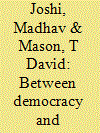

|
|
|
|
|
| Publication |
2008.
|
| Summary/Abstract |
The Maoist insurgency in Nepal presents an anomaly for students of civil war and democratic transitions. How was the Maoist wing of the Nepal Communist Party able to mobilize peasants to support their insurgency when they could not mobilize enough peasants to vote for them in elections? The authors address these questions by exploring the ways in which the persistence of traditional clientelist networks in the countryside enabled rural elites to mobilize peasants to vote for parties other than the Maoist party, even though peasants would have benefited from that party's advocacy for land reform. When that same party used insurgent violence against rural elites, peasants were willing and able to support the insurgency and abstain from voting in the 1999 election in locales where the insurgency succeeded in disrupting clientelist ties. The authors test these arguments with district-level data on election turnout and the distribution of households among several land-tenure categories. Findings support the argument that turnout was greater where land-tenure patterns gave landed elite greater influence over peasant political behavior. Where higher levels of insurgent violence disrupted patterns of clientelist dependency, turnout declined. What electoral democracy could not deliver to peasants - land reform and relief from clientelist dependency - the Maoist insurgency promised to bring through political violence
|
|
|
|
|
|
|
|
|
|
|
|
|
|
|
|
| 2 |
ID:
190434
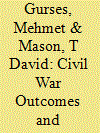

|
|
|
|
|
| Summary/Abstract |
While a growing body of research has highlighted a significant and positive relationship between negotiated peace agreements and postwar democratization, they have focused almost exclusively on a minimalist form of electoral democracy. We extend this analysis to consideration of how civil war outcomes affect egalitarian democracy, which measures the extent to which the regime incorporates (1) equal protection of rights and freedoms, (2) equal distribution of resources, and (3) equal access to power. We add V-Dem egalitarian democracy measures to the UCDP Conflict Termination dataset to determine whether civil war outcomes account for just the emergence of electoral democracy or whether they also affect the prospects for a more just and equitable society for citizens at the grassroots level. Our findings highlight the need to qualify the effect of modes of war termination on postwar democratization. Peace agreements are followed by higher levels of democratization than is the case with other civil war outcomes, but the effect on egalitarian democracy is more durable than the effect on electoral democracy.
|
|
|
|
|
|
|
|
|
|
|
|
|
|
|
|
| 3 |
ID:
073269


|
|
|
|
|
| Publication |
London, Routledge, 2006.
|
| Description |
xv, 280p.
|
| Standard Number |
0415702135
|
|
|
|
|
|
|
|
|
|
|
|
Copies: C:1/I:0,R:0,Q:0
Circulation
| Accession# | Call# | Current Location | Status | Policy | Location |
| 051541 | 327.172/MAS 051541 | Main | On Shelf | General | |
|
|
|
|
| 4 |
ID:
113527
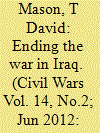

|
|
|
|
|
| Publication |
2012.
|
| Summary/Abstract |
Since the war in Iraq began in 2003, public debate over the war has centered on two options: either increase the number of US troops to defeat the insurgency, or withdraw US forces to reduce US losses. Empirical research on civil war termination suggests that neither of these two options is likely to produce a favorable outcome for the US or the Iraqi government. That same research points to the third option - negotiated settlement - that has been the most frequent manner in which civil wars have terminated in the post-Cold War era. I analyze what existing research on civil war termination suggests about how the civil war in Iraq can be brought to an end. Military victory over the insurgents is unlikely, but withdrawal increases the risk of state failure. A negotiated settlement would require a credible third-party mediator to broker an agreement between the government, Sunni insurgents, and Shiite militias, thereby isolating foreign jihadists to spoiler status. Implementation of the settlement and the durability of the peace would be enhanced by multinational peacekeeping forces.
|
|
|
|
|
|
|
|
|
|
|
|
|
|
|
|
| 5 |
ID:
134439
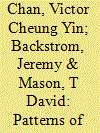

|
|
|
|
|
| Summary/Abstract |
Since the Tiananmen Square protests of 1989, there have been no national protest movements in the People's Republic of China (PRC). This is the longest period in the history of the PRC without a major national protest movement. Nonetheless, the number of small, local protests or “mass incidents” (as they are termed by the Chinese government) has increased from 9,000 a year in 1994 to over 180,000 in 2010. Most of these incidents target local party and government agencies and/or local firms. Protests by peasants are often motivated by land confiscation by local governments, while worker protests are often over firm treatment of works (including pay, benefits, and job security). More general protests arise over what participants perceive as unfair and illegal extractions of fines, fees, and other payments by local government and party units. We present a theoretical argument on how grievances and mobilization capacity affect the likelihood of protests occurring in a locale. We then test propositions derived from this theory with provincial level data for the period 1995–2010. This study represents one of the first to test predictors of the frequency of mass incidents at the province level.
|
|
|
|
|
|
|
|
|
|
|
|
|
|
|
|
| 6 |
ID:
163500


|
|
|
|
|
| Summary/Abstract |
Land reform has been depicted by some as an effective element of counterinsurgency strategy in nations experiencing peasant-based civil conflict. While some studies have argued that land reform reduces civilian support for insurgency, other research has demonstrated that these reforms are often undermined by brutal state repression. The study of land reform has also been driven largely by qualitative case study research, which has limited what we know about the cross-national efficacy of these reforms. This study contributes to the current literature by looking at the efficacy of land reform as part of the post-civil war peace process. Specifically, we examine whether land reform provisions included in comprehensive peace agreements reduce the risk of renewed civil war. Measuring the risk of civil war recurrence in all comprehensive peace agreements from 1989–2012, we find that the inclusion of land reform provisions in the post-war peace process substantially reduces the risk of renewed fighting.
|
|
|
|
|
|
|
|
|
|
|
|
|
|
|
|
| 7 |
ID:
052516
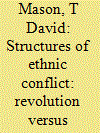

|
|
|
|
|
| Publication |
2003.
|
| Summary/Abstract |
structural framework of ethnic politics is presented, contrasting the patterns of inter-ethnic relations found in ranked versus unranked systems of ethnic stratification. This framework allows us to account for why ethnic conflict erupts in some cases but not others, and why that conflict takes the form of ethnic revolution in some situations and ethnic separatism in others. This framework's explanatory utility is illustrated with a comparison of case studies: why ethnic separatism emerged in Sri Lanka while ethnic revolution occurred in Rwanda.
|
|
|
|
|
|
|
|
|
|
|
|
|
|
|
|
| 8 |
ID:
096864
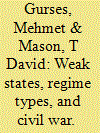

|
|
|
|
|
| Publication |
2010.
|
| Summary/Abstract |
A central theme in research on civil war and revolution is that 'weak states' are especially prone to civil war. Empirically, however, tests of this proposition have relied on proxy measures of state weakness such as GDP, mountainous terrain, and population, none of which directly measure features of the state itself. Earlier theoretical works point to particular regime types as being especially susceptible to civil war. We present a theoretical argument that delineates what regime types are more or less prone to civil war (and why) and test this theory with a series of logit models using Fearon and Laitin's and Sambanis' civil war data sets and Geddes' data classifying non-democratic regimes. The findings support earlier theoretical arguments that particular types of weak states - personalist or neopatrimonial regimes - are more prone to civil war onset than others.
|
|
|
|
|
|
|
|
|
|
|
|
|
|
|
|
| 9 |
ID:
084551
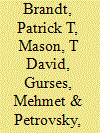

|
|
|
|
|
| Publication |
2008.
|
| Summary/Abstract |
Previous research has shown that the duration of a civil war is in part a function of how it ends: in government victory, rebel victory, or negotiated settlement. We present a model of how protagonists in a civil war choose to stop fighting. Hypotheses derived from this theory relate the duration of a civil war to its outcome as well as characteristics of the civil war and the civil war nation. Findings from a competing risk model reveal that the effects of predictors on duration vary according to whether the conflict ended in government victory, rebel victory, or negotiated settlement.
|
|
|
|
|
|
|
|
|
|
|
|
|
|
|
|
| 10 |
ID:
105236
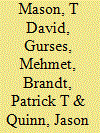

|
|
|
|
|
| Publication |
2011.
|
| Summary/Abstract |
We argue that the duration of the peace after civil wars is mainly a function of the extent to which the outcome of the previous civil war preserved a condition of multiple sovereignty and the extent to which the post-civil war environment creates incentives for dissident groups to resort to violence rather than sustain the peace. Hazard models suggest that the outcome of the previous conflict does affect the duration of the peace, and this effect varies across time. The introduction of peacekeeping forces has a substantial positive effect on peace duration. We also find evidence of a curvilinear relationship between ethnic fractionalization and post-civil war peace duration. Based on these results, we conclude with recommendations for how peace can be maintained after a civil war.
|
|
|
|
|
|
|
|
|
|
|
|
|
|
|
|
| 11 |
ID:
168797
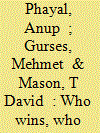

|
|
|
|
|
| Summary/Abstract |
Previous research has shown that the outcome of a civil war is related to conflict duration: military victory by either the government or the rebels occurs early if it occurs at all, and the longer a civil war lasts, the more likely it is to end in a negotiated settlement. The models of civil war duration and outcome that have produced these findings are built on characteristics of the civil war and less on attributes of the state itself, other than where the state lies on the Polity autocracy-democracy scale. We propose that how civil wars end varies not only between democracies and authoritarian regimes but among the different authoritarian regime types identified by Geddes, Wright, and Franz. The distinguishing attributes of these regime types—democracy, one-party, personalist, military, monarchical—should lead to different likelihood in defeating a rebel movement, being defeated by a rebel movement, and negotiating a peace agreement with a rebel movement. Results from a series of competing-risk models using the Uppsala–Peace Research Institute Oslo Armed Conflict Dataset demonstrate support for our claim that how civil wars end is partly a function of the characteristics of the regime.
|
|
|
|
|
|
|
|
|
|
|
|
|
|
|
|
|
|
|
|
|